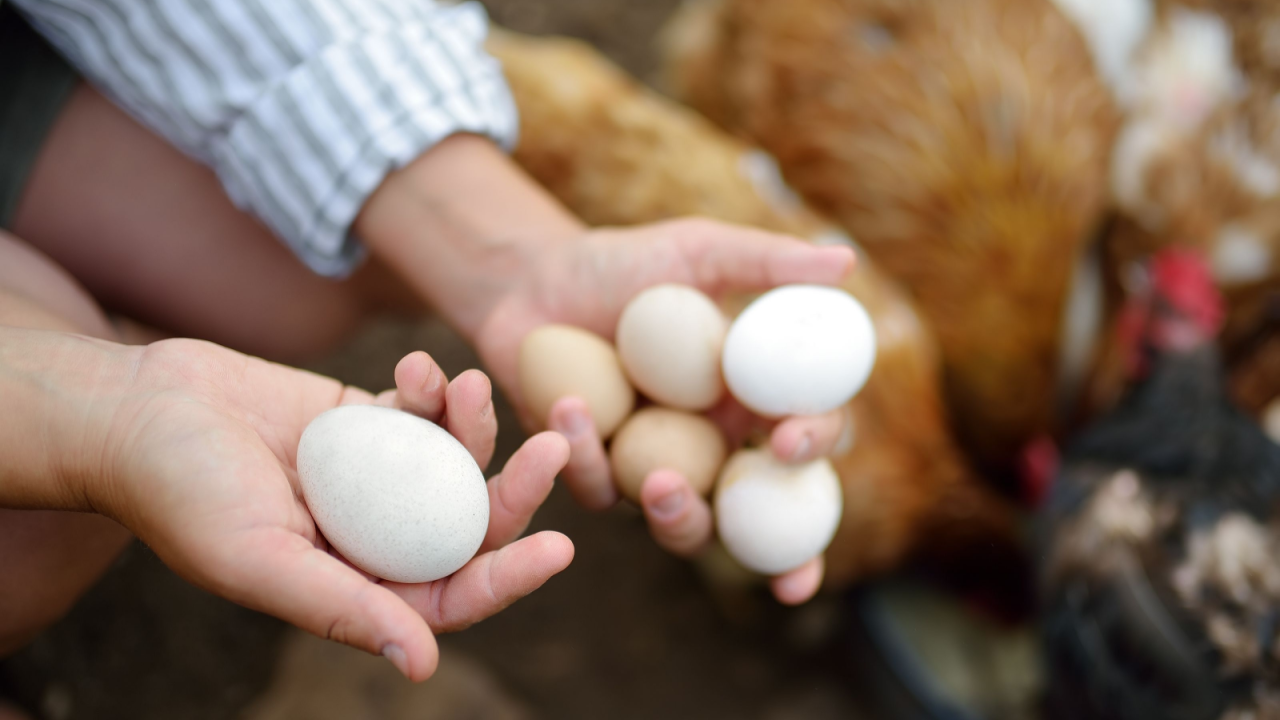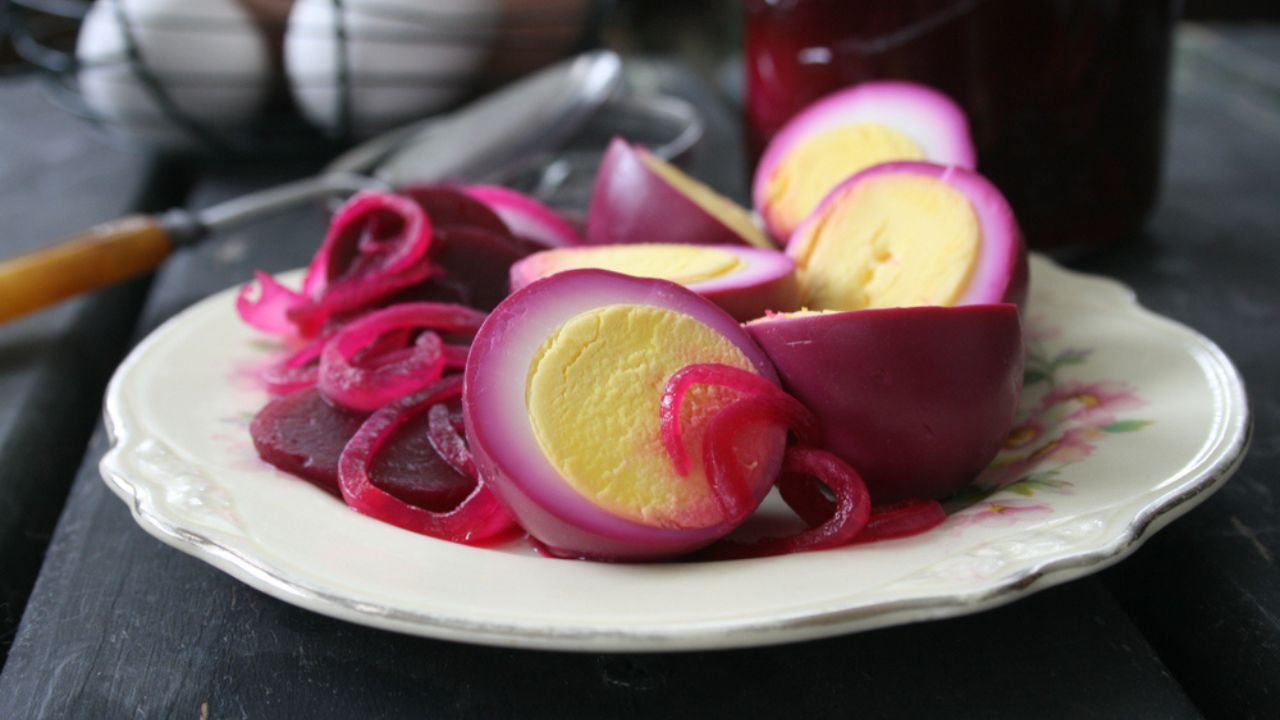If you’re raising chickens and had a problem with chicken math (or very productive hens), you might end up with more eggs than you can use. If you’ve ever found yourself with too many eggs, you know it can be a bit of a conundrum. After all, eggs are perishable, so you can’t just let them sit around.
There are many things you can make with them, but your first step is to learn how to store them properly and preserve them safely. This way, you can ensure you get the most out of your eggs for as long as you can. In the end, it’s a good problem to have if you know what to do with them!
How to Store Your Eggs

Image Credit: Shutterstock.
One of the first and most important things to learn is how to store your eggs. If you’ve come into a bounty with your backyard chickens, you can make it last longer by learning to store the eggs correctly.
If you’ve ever had the pleasure of gathering eggs from your own chickens, you know that they don’t come clean. Typically, they’ll have a bit of straw or dirt on them, and sometimes an errant feather or two. If they are relatively clean, typically, homesteaders will dry clean to keep the egg’s bloom (a natural protective layer) intact.
If there’s only a bit of dry dirt, brush it off with a soft toothbrush or with a dry towel, and you can then keep those eggs at room temperature for 3 to 4 weeks. After that, they’ll need to be stored in the fridge or processed some other way (as we’ll review in this article).
If you need to wash the eggs, place them in the fridge right away, and they’ll be good for up to 3 months. The best way to clean fresh eggs is with warm water: get them wet, gently wipe the eggs clean, then rinse and dry them with a clean towel.
If you’re not planning on using the eggs right away, you can store them in the refrigerator for up to three months. All these numbers can vary depending on when you collect eggs, the outside temperatures, and more.
Now that you have them properly stored, let’s look at other ways to use them or prep them further to get more life out of them!
What to Do with Too Many Eggs- 1. Make Scrambled Eggs to Freeze

Image Credit: Shutterstock.
Of course, cooking them in a pan is one of the easiest ways to enjoy your eggs! You can make up a big batch of scrambled eggs and then freeze them this way. First, make scrambled eggs as you normally would. Let the eggs cool slightly, then transfer them to an airtight container and store them in the freezer for up to 2 months. When you’re ready to eat, simply reheat the eggs in the microwave for 1 minute or so, stirring occasionally until warmed through.
Add whatever toppings you like (cheese, diced ham, sautéed veggies, etc.), and enjoy! If you don’t want to cook them first, you can also freeze raw eggs (not in the shell) to cook later.
2. Make Lots of Your Favorite Cookie Recipe

Image Credit: Shutterstock.
You can also use those eggs to bake up big batches of your favorite cookie recipe. Extra eggs in the recipe will make your cookies extra fluffy. You can also make a lot of cookies and then freeze them, so they last longer.
Amish monster cookies are some of my favorites!
3. Frittata

Image Credit: Depositphotos.
A frittata is a type of egg dish that is similar to an omelet or quiche. It typically contains eggs, vegetables, and cheese, and can be served for breakfast, lunch, or dinner. One of the great things about frittatas is that they are very versatile – you can use whatever vegetables you have on hand, and they can be served hot or cold.
Another plus is that they are relatively quick and easy to make. To make a frittata, simply whisk together some eggs, add your chosen vegetables and cheese, and then cook in a frying pan until the eggs are set.
Need step-by-step instructions? Here are my favorite frittata recipes:
4. Quiche

Image Credit: Shutterstock.
Quiche is a delicious savory custard pie that originated in Germany. It is typically made with eggs, cream, and cheese, and can be enhanced with a variety of additional ingredients such as meat, vegetables, and herbs. You can have it for any meal of the day, served hot or cold.
Here are a couple of delicious quiche recipes:
5. Egg Salad

Image Credit: Shutterstock.
Egg salad is a versatile dish that can be enjoyed in a variety of ways. Hard-boiled eggs are the traditional choice, but eggs can also be poached, scrambled, or even baked before being added to the salad.
The eggs are then combined with mayonnaise, mustard, and a variety of other ingredients such as celery, onions, and herbs. This simple dish can be served on its own or used as a filling for sandwiches and wraps.
6. Meringues

Image Credit: Shutterstock.
Meringue is a type of dessert made from whipped egg whites and sugar, which are then baked to create a light and airy treat. The eggs give the meringue its structure, while the sugar helps to stabilize the mixture and prevent it from collapsing.
There are two main types of meringue: French meringue, which is made with uncooked egg whites, and Italian meringue, which uses hot sugar syrup. Both types of meringue can be used to make a variety of desserts, including pies, cookies, and cakes.
7. Egg Bake and Sheet Pan Eggs

Image Credit: Shutterstock.
Sheet pan eggs are easy to make and can be tailored to your liking. To make sheet pan eggs, start by preheating your oven to 400 degrees Fahrenheit. Then, line a baking sheet with parchment paper and crack eggs in there and bake for 12-14 minutes, or until eggs are firm. That’s great when cooking breakfast for a crowd.
Or, you can make an egg bake casserole. My friend LeAura uses this recipe for her family on a regular basis.
8. Homemade Mayonnaise

Image Credit: Shutterstock.
Making your own mayonnaise is surprisingly easy, and it only takes a few minutes. Start by whisking together eggs and vinegar in a bowl. Then, add oil to the mixture a little bit at a time, whisking constantly until the mayonnaise is thick and creamy. Season to taste with salt and pepper and enjoy your homemade creation! Store leftovers in the fridge for up to a week.
9. Poached Eggs

Image Credit: Shutterstock.
A poached egg is an egg that has been gently cooked in water. The result is a tender and flavorful egg that can be enjoyed on its own or used in a variety of recipes.
Poaching eggs is a simple process, but there are a few things to keep in mind. First, be sure to use fresh eggs for the best results. Second, use water that is at a gentle simmer before adding the eggs. Finally, be careful not to overcook the eggs – they should be cooked just until the whites are firm and the yolks are still runny.
10. Avocado Egg Toast

Image Credit: Shutterstock.
A healthy, delicious breakfast that doesn’t have to take a lot of time or effort to make is avocado egg toast. It is a simple dish that only requires a few ingredients and can be on the table in less than 15 minutes.
Start by slicing an avocado in half and removing the pit. Then, using a fork, mash the avocado until it reaches the desired consistency. Spread the avocado on a slice of whole-wheat toast and top with a sunny-side-up egg. Season with salt and pepper to taste.
11. Pickled Eggs

Image Credit: KITCHENADE at Shutterstock.
To make pickled eggs, all you need is a jar, some eggs, and your favorite pickling recipe. Start by hard-boiling the eggs, then cool them down in a bowl of ice water. Once they are cooled, gently crack the shells and peel them away.
Next, add the eggs to your jar, along with any spices or aromatics you like. Finally, pour in the pickling liquid, screw on the lid, and refrigerate for at least 24 hours before enjoying. Pickled eggs will keep in the fridge for up to two weeks, and they make a great snack or addition to any meal.
Want an even easier way? Use the brine from a jar of pickles you have already used: just drop your boiled eggs in there and place the jar in the fridge. I like using the brine from pickled beets for a gorgeous pink egg!
12. Dehydrated Eggs

Image Credit: Shutterstock.
Dehydrated eggs are a great way to have eggs on hand without having to worry about them going bad. They are easy to make and only require eggs, a dehydrator, and a little bit of time. The first step is to hard-boil the eggs.
Once they are cooled, peel them and cut them into thin slices. Next, spread the egg slices out on the dehydrator trays and set the temperature to around 145 degrees Fahrenheit. Dehydrate for 12-24 hours, or until eggs are dry and brittle. Store in an airtight container in a cool, dry place. When you’re ready to use them, just add water and let them soak for a few minutes.
13. Egg Waffles

Image Credit: Shutterstock.
Egg waffles are a type of pastry made with eggs, milk, flour, and sugar (basically waffles, just go big on the eggs!). They are typically served hot and are often topped with fruit or chocolate sauce. You can also make waffles and then freeze them to keep them longer.
14. French Toast

Image Credit: Shutterstock.
French toast is a classic. All you need is some bread, eggs, milk, and a little bit of sugar and cinnamon. In just a few minutes, you can have a delicious breakfast (or brunch) that will satisfy your cravings and leave you feeling happy and content.
15. Deviled Eggs

Image Credit: Shutterstock.
Deviled eggs are eggs that have been boiled, and then the yolks are removed and mixed with other ingredients such as mayonnaise, mustard, vinegar, and spices. The mixture is then spooned back into the egg whites and served chilled.
16. Pound Cake

Image Credit: Shutterstock.
A pound cake is a rich, dense cake that gets its name from the original recipe, which called for a pound each of flour, sugar, eggs, and butter. Today, pound cakes are usually made with a lighter ingredient list, but they still retain their signature heaviness. The eggs are essential to the cake’s structure; without them, the cake would be dense and gummy.
17. Egg Muffins

Image Credit: Shutterstock.
So many ways to make these! Loaded with a variety of fresh vegetables, meats, and cheese, these egg muffins can be frozen for a quick breakfast on the run.
What to Do with Too Many Eggs FAQ

Image Credit: Shutterstock.
Now that you know some things you can make with your eggs, let’s look at some frequently asked questions about too many eggs.
How do you store too many eggs?
Eggs can last for quite a while if they’re stored properly, but it’s important to keep a few things in mind. First, eggs should be stored in a cool, dry place – ideally, in the refrigerator. If it’s not possible to keep them in the fridge, then make sure they’re stored in a dark place where the temperature is consistent. They will last longer if their bloom remains intact (something that is removed from store-bought eggs).
Is it better to freeze eggs raw or cooked?
Any cook worth their salt knows that eggs are a versatile ingredient. They can be used to make everything from a simple omelet to a soufflé. But is it better to freeze eggs raw or cooked?
The answer depends on what you plan to use the eggs for.
- Boiled eggs will become rubbery after being frozen, so I wouldn’t recommend freezing boiled eggs.
- Eggs baked into your favorite quiches, frittatas, and egg bakes freeze really well, so give that a try.
- If you’re going to use the eggs for something like an omelet or scrambled eggs, then it’s better to freeze them raw. This way, they’ll retain their moisture and won’t end up being rubbery.
Whichever way you choose to freeze your eggs, make sure to label them so you know how to use them later.
What to do with a lot of eggs about to expire?
One option is to make a big batch of scrambled eggs and freeze them in individual portions (as mentioned abo e). That way, you can have a quick and easy breakfast any day of the week. Another idea is to make a frittata or quiche – both can be easily reheated, so they make great leftovers for busy weekday mornings. Honestly, any of the ideas we just reviewed will work great!



5 Fun Breeds Of Chickens That Lay Green Eggs
Monday 27th of March 2023
[…] If you end up with too many eggs, you’ll love my list of things to do with eggs. […]